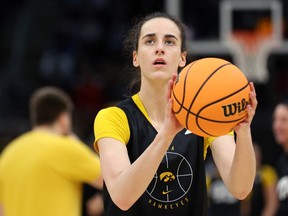Steve Simmons: Why Team USA’s Caitlin Clark snub will live in Olympic infamy
The most watched, talked about, cared about, loved, hated, cherished and despised player in women's basketball is being left behind

It made little sense when it was first announced.
It makes less sense today.
Caitlin Clark isn’t going to the Olympics. USA Basketball made that terrible decision weeks ago.
The most-watched, talked-about, cared-about, loved, hated, cherished and despised player in women’s basketball is being left behind for reasons that defy logic.
USA Basketball said it was putting together the best team to win a gold medal, which is kind of funny, because all the U.S. has to do is show up for the Olympics and they win gold. They are so far ahead of the rest of the world in the sport — from the women’s side — that they could send a group of players they didn’t even consider for Team USA and still win gold.
This wasn’t about winning or losing. This was about control and a small mind when it comes to big business.
This isn’t like women’s hockey where there are two teams nearly equal playing against each other for gold every four years. There is only one team in women’s basketball. And Caitlin Clark, the most important figure in women’s basketball, should be there representing her sport.
Building her sport.
This has been the greatest year there has ever been for women’s basketball and the reason for it begins with Clark. In college, people who never watched women’s basketball before, were suddenly watching it for the first time. The reason? The phenomenon that is Clark.
She was drafted into the WNBA three months ago, during a show that not many had bothered to watch in the past, but had suddenly become mainstream viewing for Americans.
When she started playing for the last-place Indiana Fever, the team was selling out home games, selling out road games, having games moved from smaller venues to larger ones.
which Clark, already the WNBA record-holder for assists in a single game, plays in.
Is she the best player in women’s basketball? No. Is she the most interesting? Not really. Is she the most dynamic? No.

Whatever it is that she has you can’t bottle. It’s natural. It’s now gone mainstream, like McDonald’s across America. She’s the french fries here. The one game you’re going to watch. And the business has grown alongside her, as well as making her a multi-multi- millionaire.
You can’t always understand what becomes popular and why. It just happens organically sometimes. Some things and some people and some athletes just find a way. It’s not always easily defined. But when you do the math, it can be easily accounted for.
TV ratings have never been this high for WNBA, which has mostly been a losing proposition over the years. All-star voting, which never got tracked the way it’s being tracked now, was up almost 600% this year.
This is what happens with Clark. Interest explodes. Not having her in Paris is limiting for a sport so intent on growing.
What USA Basketball needed to do was view the big picture here rather than the small one. It needed a place for Clark on the Olympic team. Whether it was a large role or a small role, it didn’t matter.
It needed a point of conversation, which it lost in the process.
I have been to seven previous Summer Olympics and have covered almost every gold-medal match in the men’s basketball tournament. Even when the Dream Team — or whatever form it became — was playing someone who had no chance of winning gold.
It was still worth it to watch LeBron James or Kobe Bryant, Kevin Durant or Kyle Lowry win the gold.
Yet I have never covered, or been assigned to cover, a women’s basketball gold-medal match. The reason: It never seemed like much of a story. Team USA has won 55 Olympic games in a row. It has won seven gold medals in a row. That’s dominant and boring all at the same time.
This tournament had a chance to be a story with Clark in attendance. Instead, USA Basketball has stared at the growing business that is women’s ball and decided that smaller was better than larger. That being unpopular was better than being popular. That being noticed — both as a sport and a business, wasn’t as important as not being noticed.
My friend Christine Brennan at USA Today, wrote that the “last amateurs left in the Olympics are the people running them.” She is correct. That was in criticism of Clark being left off Team USA.
Indiana picked first in the WNBA draft in selecting Clark. Their record last season was 13-27.
In their past 10 games, the surging Fever has Clark averaging 18.6 points a game and a league-high 11.7 assists. All of this in her rookie season. With all eyes on her. With pressure from inside and out. With so many lined up to tear her apart at the earliest notice.
Clark has been a reason to watch the WNBA this season. She would have been a reason to watch women’s basketball at the Olympics had she been there. Fewer people will watch now.
How is that good for the sport?








